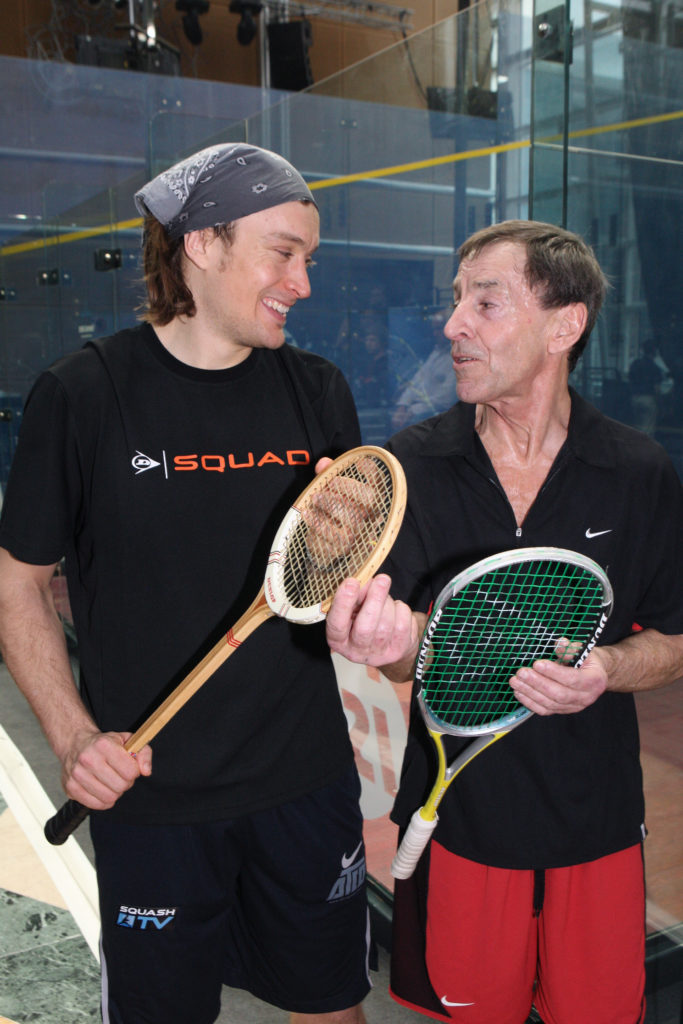
Outside The Glass, the world’s leading squash podcast, is a radio show with a new episode coming out at the beginning of each month. In episode four, Joey Barrington, the lead commentator for SquashTV and former world No. 24, spoke about his father, six-time British Open champion Jonah Barrington.
Outside The Glass
When you were growing up, how did your father train?
Joey Barrington
The garage was converted into a gym. I used to spend a lot of time just watching Dad doing his off-court training in the gym. It was so experimental: big medicine balls that weighed probably more than 10 kg, like the proper boxers’ medicine balls; these weighted—it was really old-school—shoes that you’d strap to your trainers and he’d do leg-lifts; all the dumbbells and machines; and a makeshift rowing machine that he kind of put together. I was fascinated to see him thrashing around, doing this for hours on end and seeing the sweat develop very quickly. Obviously the fitter you are, the quicker you sweat. For me it was better than watching television, really. I was only four or five years old. I’d sit there for hours on end.
OTG
You told me he created the training method of ghosting.
JB
He invented ghosting—shadow movements. We went on an amazing trip to South Africa. It was St. Francis Bay for the Christmas break. We were on the beach and he marked out the court. He was in his Speedo-esque swim-wear. Very brown, very muscled, of course. He started playing a match against himself, ghosting. People started coming. There was a couple of hundred people by the end of it, just watching him, thinking “Who is this crazy man trying to swat flies on the beach with a squash racquet?” He wasn’t doing it to show off, but to get on and do his thing. He wanted to do his session.
He loves the sun. One of his mentors when he was young, a guy in Australia, one of the first things he instilled in him was cosmetic fitness, as it was called. Always have a good, healthy tan. Which a lot of the Australians—Geoff Hunt, Kenny Hiscoe—always had over the English. Before big events, Dad would probably go and do warm-weather training and get very tanned. He’d turn up and he’d looked quite intimidating to say the least. He was always wanting to get sun and maximize heat on the body.
OTG
He went to Kenya to train in the high-altitude, right?
JB
Yes, he went to Kilimanjaro, particularly in the later years before British Opens, high-altitude training. It was quite clever, really, because altitude training is a brutal kind of training. Word spread around the world. So he would get to the British Open and have a massive mental advantage. They realized that he was coming into the event even fitter than ever.
OTG
He thought a lot about the game, as a player and a writer.
JB
I have always loved his takes on the every-day things of training. Calling it therapy. I remember once when I was younger I was having a tantrum and I threw my racquet. He said, “you know, a warrior never discards his weapon.” I always loved history, passionate about warriors. As a kid, I was impressionable and squash is a warrior sport. He has an amazing ability to convey these things.
OTG
You told me a story about the moment when you decided to become a pro.
JB
When I was at university, I went to Edgbaston Priory for a National League match and saw Del Harris playing. He had a great presence on court. Something clicked. I called home: “I might want to have a go at being a professional squash player.” Dad barely responded. It was a ludicrous comment. I was playing No. 4 on my university team. I was nineteen. He backed off and waited to see if I was the real deal, if I was serious.
OTG
For a lot of sons, there is a moment when they can beat their father.
JB
When I started training more, we didn’t go on court that way. He had just had his first hip relining and he wanted to play the British Open Masters. So we started training a bit together. We’d do two sessions a day. We’d play these amazing condition games, these length games. It was pretty awesome. I loved it.
Beating him wasn’t an issue for me. I had witnessed him in a lot of pain as a kid, as a teenager, in the 1990s when he had the arthritis in the hip. I had seen him in so much discomfort, bent over, in agony. It wasn’t about beating my father. It was highly competitive when we did the length games. It was just nice to be on court with him. He had been helping so many other kids. He had spent so much time with other people’s children, with all his commitments, everyone wanting a piece of him, that it was nice to get some time with him. It was quality time.

